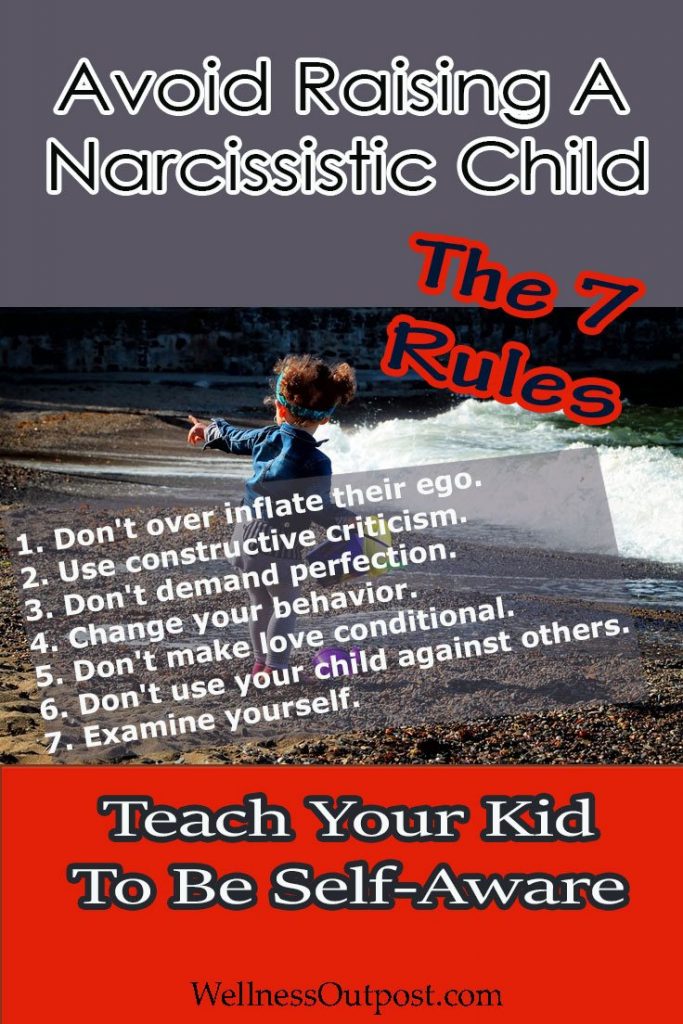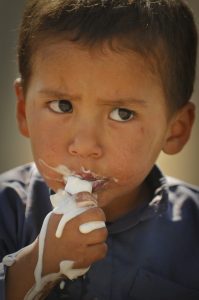Did it ever cross your mind that you might be raising a narcissistic child? Of course not. Nobody decides consciously to raise a child with narcissistic traits.
However, if you’re not aware of your own behavior towards your kid, you may be contributing to your child’s agony as he or she transitions from being a young person to becoming an adult, capable of hurting others and getting hurt with a big dose of reality.
Post Contents
Introduction – Nobody Is Born A Narcissist
Unlike being born with a talent of some sort, like playing music, being a passionate sculptor, or having great vocal chords, a narcissist is made into being who they are.
Narcissists are often portrayed as self-absorbed people who think the world revolves around them and their needs. You can learn how to spot a narcissist with a few simple steps.
Narcs (short for narcissists) can get obsessive about how they look and what people think of them, making them a bit more concerned about shallow appearances and things that don’t really matter, over depth and connections. There are probably no real resources on how to raise a narcissist (they may exist as a joke). There are, however, plenty of resources on how to stop being a narcissist.
Take a look at this quadruplet. These girls can’t stop loving each other and hugging one another. They are very caring at a very young age, possibly because they were encouraged to be affectionate, and because they are mimicking their parents or family members.
The Making Of A Narcissist
It’s hard to imagine, but becoming a narcissist is sometimes a byproduct of various environments that were present at the time of the child’s early developmental years.
Parents play a huge role in shaping the child into a future narcissist. Often times, one or both parents are narcissistic in nature.
“Flatter me, and I may not believe you. Criticize me, and I may not like you. Ignore me, and I may not forgive you. Encourage me, and I will not forget you. Love me and I may be forced to love you.” (William Arthur Ward)
The child usually grows up with behaviors that are dependent on the dynamics of the home.
Take any culture or society in the world, the child becomes a part of his or her surroundings. They get highly influenced by how their culture defines its values, how the parents interact with each other, and how the parents interact with them and with other siblings (if there are others).
This applies to homes with single parents or to homes with both parents present.
When there is narcissism in the home, the kid may adapt to the behavior of the parent(s) who may have narcissistic traits themselves. At times, the child may become demanding, ungrateful, or uncaring, just like the narcissistic behavior they may have seen in their parent(s), or encouraged by their parent(s).
Often times, narcissists don’t know the extent of the damage they inflict on others because their identity is shaken. They are somewhat incapable of seeing their true self or getting deep into their inner self. When it comes to romantic love, a narcissist’s behavior becomes predictable.
RELATED: How Narcissists See Themselves (Their True Self And 3 Love Stages).
Do Narcissists Know The Extent Of The Damage They Leave Behind?
More often than not, the narcissist will not recognize that they are the root of the problem. They continue having failed relationships and blaming the failure on the other party.
Narcissists may go to therapy, but it is rarely to address their own behavior in a relationship.
According to Psychology Today not all narcissists can change, but some may be able to “shift into a more flexible form of intimacy”. The Mayo Clinic also addresses the potential of change and offers a comprehensive plan to face the symptoms, diagnosis, and treatment methods of narcissistic personality disorder.
It is not a fun reality to wake up one day and realize the hurt that someone’s narcissism has caused others. You may be able to spare your child this agony if you pay attention to how things are going early on and change your behavior to instill a healthier, more self-aware child.
How To Raise A Self-Aware Child
 Your kids don’t need to grow up becoming narcissists and hurting others. Here are some rules to consider.
Your kids don’t need to grow up becoming narcissists and hurting others. Here are some rules to consider.
Rule 1: Don’t Over Inflate Your Child’s Ego For No Good Reason
Don’t tell your child that they are a princess or a prince above all other people, and for no good reason.
Meaning, don’t over-inflate the ego of your child from a young age. Instead, teach them how to stop being self-absorbed. There are ways to do that.
Be the role model…
Perhaps help others in need in front of your child, share a meal with a person in need, volunteer somewhere and share the reasons why you’re helping out. Encourage your kid to do something similar. Help an elderly neighbor with something they might need doing (i.e. help clean their yard after a storm) and get your child to help too. Sell them on the humanistic benefits and show your enthusiasm for the project.
Your kid will absorb everything you do and will process your actions as golden rules.
This will be a great, positive experience that your child can learn from. For you, it is a good way to learn how to teach empathy to a narcissist at an early age. Your kid will think of others in need. They will step outside of their comfort zone, learn how to be of service to others who might be less fortunate, and impact the world in a positive way. If your child is showing narcissist behavior already, this will be a great exercise to help a narcissist child learn from better examples.
Contrast this with a parent who puts other less fortunate people down, makes fun of the elderly, or disrespects their own parents. What do you think their children will grow up believing?
“Be like the bamboo, the higher you grow the deeper you bow.” (Chinese Proverb)
Rule 2: Nobody’s Perfect! Use Constructive Criticism
Don’t falsely say to your child that they are best at everything.
 When you tell your children that they are the best at everything without real cause, you will create a child who may not be capable of accepting constructive criticism at a later age.
When you tell your children that they are the best at everything without real cause, you will create a child who may not be capable of accepting constructive criticism at a later age.
Think of when they have to get into the work force… They will have bosses and they will have to deal with other people. Being able to be a team player is important. Realizing that there’s always room for progress is better than thinking that there’s absolutely no room for growth from a young age.
Instead of pressuring your child to always want your approval because “they are the best”, make sure you are giving them a foundation on which to base all these “best at everything” assumptions.
In essence, the child may be good at something, but not necessarily best at everything!
If they are good at something, like playing sports, then nurture that in them without inflating their ego to a balloon size.
If they are not good at something, encourage them to do better but without putting them down. Say something like “(smile) Oh honey, this is fantastic, but you know what would make it even better? It’s when you add a bit more/ do a bit more (fill in the blank). Wanna try?”
Believe in their abilities but don’t tell them that they are the best at something that they are not good at. An almost adult young kid who sings off key should not be told that they have the best voice in the whole world. Encourage them to be better, pay for singing classes (if they want to take it further), but don’t tell them that they have a better voice than Rihanna (and convince them of it). That’s a sure way to get them disappointed with real life later.
“Check your ego at the door. The ego can be the great success inhibitor. It can kill opportunities, and it can kill success.” (Dwayne Johnson)
Find your child’s true genius and encourage it. We all have amazing capabilities inside of us.
Rule 3: Stop Demanding Perfection
Stop criticizing your child for not being the “perfect” child that you’ve always wanted them to be (or wanted to be yourself).
 Children will make mistakes. They may want to get dirty outside in the mud, and may not really want to become a ballerina, play soccer, or football, but are doing it because you asked them to.
Children will make mistakes. They may want to get dirty outside in the mud, and may not really want to become a ballerina, play soccer, or football, but are doing it because you asked them to.
Find other talents that they might need nurtured. Sometimes your kids’ genius comes out when they are given an opportunity to express themselves.
Sons and daughters of covert narcissistic mothers or fathers often indicate how strict and demanding their parent was.
A child may not be a genius in school, but may be brilliant at woodworking, or speaking, or thinking. Help them pass their classes and their grade, but don’t compare them to other kids who may have different capabilities. Your child needs to be accepted for exactly who they are.
Let’s say you want your kid to learn how to play the guitar. Why not take him or her to a music shop and let them pick what they enjoy? Maybe they will fall in love with the piano, and maybe they become so passionate and amazing at playing Rachmaninoff’s piano concerto no. 2 that they become a pianist with the Chicago Symphony Orchestra.
Maybe they dedicate all their success to you, their loving parent who encouraged them to live their life with passion. Maybe they will be so happy in their life, instead of their mediocre existence playing guitar, and eventually dropping the instrument and music all together, because that wasn’t really their passion. It was yours.
Rule 4: Observe And Change Your Own “Flying Monkey” Behavior
Don’t show your child that you are a “flying monkey” for another narcissist.
The term was originally “winged monkeys”, which is mentioned in L. Frank Baum’s classic children’s novel “The Wonderful Wizard of Oz”. The winged monkeys helped the bad witch do bad things and carry out attacks on her behalf.
In the narcissistic world, these are the people who act on behalf of other narcissists. Think of them as an aid to a person with narcissistic personality disorder. Flying monkeys should not be confused with enablers (who tend to allow the behavior to occur). Flying monkeys actually help in the process and believe in the narcissistic person’s fake persona.
If you remember watching the 1939 classic movie (with Judy as Dorothy and My favorite… Margaret Hamilton as the wicked witch), then you remember the scene where the Wicked Witch Of The West sent out her winged monkeys (flying monkeys) to do her bad deed.
“Take your Army to the Haunted Forest and bring me that girl and her dog! Do what you want with the others, but I want her alive and unharmed. They’ll give you no trouble I promise you that! I’ve sent a little insect on ahead to take the fight out of them. And keep special care to those Ruby Slippers, I want those most of all…now FLY, FLY, FLY! ” (The Wicked Witch of the West)
Let’s say for example you are dating a new person in your life (doesn’t matter if it’s a man or a woman). Let’s say this person’s name is Chris. You and Chris were dating until Chris decided to go back to an ex. After 3 months, Chris comes back to you saying that his ex was crazy and manipulative. Chris spreads rumors about the ex (maybe they’re doing drugs, or stealing money, etc.) and you repeat all of it to your friends in front of your kid.
In essence, you are aiding the narc in a smear campaign (where the narcissist is out to discredit a victim that they wronged) and you help them out spread the rumors that the victim is “crazy”, or “manipulative”. Instead, you want to use the gray rock method and avoid a narcissist escalation of drama in these situations.
Are you SURE that the other person is crazy, a druggy, or a manipulative person? Shouldn’t you examine more WHY Chris left you to date someone else and then return back to you in the first place? Shouldn’t you investigate more and shield your child from seeing you becoming a flying monkey without true evidence?
If you show your child that you are an aid to a narcissist, then you are a flying monkey.
The bottom line is that you need to be aware of narcissistic abuse symptoms. There’s no excuse for abuse. Stand up for humanity, and teach your kid to do the same.
Most importantly, examine your relationship with this narcissist. As a flying monkey, are you selling yourself short, being a repeater of smear campaigns (without cause), and teaching your kid how to gossip?
Rule 5: Stop Having Conditions On Love
Don’t make conditions on the love you provide to your child.
Not only is this damaging, but a really terrible way to show you care.
Don’t say something like “If you do this, then I will love you.” or “If you do this, then I will not speak to you.” Or better yet, “If you don’t do this, then you don’t love me.”
Your child needs to know that they can always count on your love, your support, and your protection at all times. This is the healthy dynamics of a parent-child relationship.
If your child’s behavior upsets you, tell them that their behavior has resulted in a situation, and that they need to take responsibility for their action.
Tell them you love them and try to understand why they are throwing a temper tantrum. Make a deal with them for next time and don’t withhold love. You can withhold their allowance after explaining to them why you are doing it, or their TV time, but never your love and protection.
Rule 6: Never Use Your Child Against Your Ex Or Against Other People
Never use your child against your ex relationship or against anybody that is a part of their circle.
Always buffer your child from harm and negativity, because the child may be at a formative age and they will remember this event as being so stressful and damaging.
Make sure to speak in good terms about their other parent of family member, unless there’s of course some other forms of abuse, then consult with someone who can help you gain custody and shield the child completely.
Rule 7: Look Yourself In the Mirror And Examine Your Own Self
Take a look at yourself in the mirror. Are you a narcissist yourself?
If you want what’s best for your child, then you MUST examine this fact.
Take a look at the 12 traits of a narcissist. Educate yourself on what you need to do to lessen the stress on your child.
You really want your child to grow up to be a functional adult that doesn’t repeat the same mistakes that you made with him or her.
The Bottom Line On Raising Narcissistic Children
A narcissistic person will grow up wanting to please the parent all the time. That’s not a way to gain independence and become a functional person in society.
As a parent, it is important to instill a sense of independence, self-esteem, and unconditional love in your child. It is important to shield them from the negativity of adult bickering behaviors. It is super important to show that they are loved and that there’s always room for improvement.
When your child is reassured at a young age that they are loved no matter what happens (positive or negative events), the child will grow up capable of taking constructive criticism and praise, rather than only dwelling on negativity and criticism and wanting to please you to gain your love.
This ultimately creates a healthier adult, capable of taking responsibilities in various types of relationships, and looking forward to learning how to grow and navigate life.
What about you?
I’m sure you have a lot of ideas to add to the list. If so, share your thoughts below and keep the thoughts coming.
Be well.































